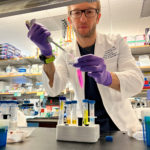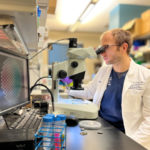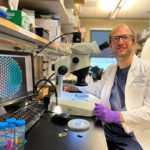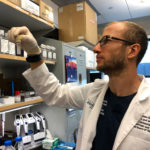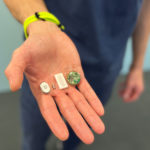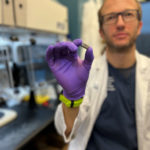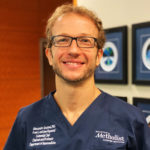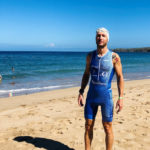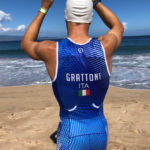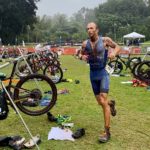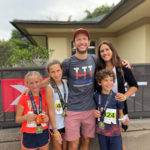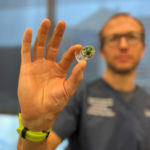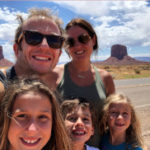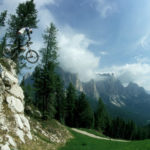When and how did you get motivated to become a scientist?
My early passion for mechanics was spurred by my grandfather Alberto who was an engineer at heart. He taught me how to use machining tools and design electrical circuits when I was 8 years old. Additionally, my father Paolo is an electronic engineer and scientist. I knew since high school that I wanted to follow in his footsteps and pursue a career in research. However, it was due to my mother’s influence that I developed an interest in more heartfelt pursuits. It is on her side of the family that most of the creativity comes from, as both she and my uncle were artists. Ultimately, the combined influence of my family inspired me to enroll into a mechanical engineering program with a focus on biomedical sciences at Polytechnic of Turin, in Italy. Nearing graduation, I developed a passion for bioengineering. I attended a lecture by Dr. Mauro Ferrari, a pioneer in the field of nanotechnology for medicine. His presentation introduced me to the use of nanotechnology for biomedical applications, which “clicked” for me. Determined to join Dr. Ferrari’s research group in the USA, I enrolled in a doctoral program in biomedical engineering at Polytechnic of Turin focusing my research on nanotechnology-based membranes. I started following Dr. Ferrari by train during his work trips in Italy to show him my research. During this time, my mother was diagnosed with mesothelioma and passed away shortly after. Shocked by the sudden loss, I found comfort in pursuing a career in the biomedical field, wanting to make a meaningful contribution to society. I felt that if I accomplished this, I could have somehow virtually treated my mother’s disease. For this, I knew that USA was the place to be; when Dr. Ferrari asked me to join his team at the University of Texas Health Science Center at Houston, Texas, I immediately agreed. He allowed me significant independence, nurturing my creativity and initiative. I raised through the ranks and became faculty soon after. However, from my early career until my appointment as Professor and Chairman of the Department of Nanomedicine at Houston Methodist Research Institute, Dr. Ferrari has remained as a great mentor. Now I feel blessed for having a fantastic multidisciplinary team of students, trainees, and staff coming from all over the world, and who are pushing the boundaries of nanotechnology for medicine.
What are you and your research team working on?
My research is focused on the development and clinical translation of implantable nanofluidic systems for the controlled release of therapeutics and cell transplantation for the prevention and treatment of chronic diseases including HIV, cancer, type 1 diabetes, obesity and metabolic syndrome. In simple terms, we develop small capsules that once inserted under the skin, or inside a tumor, they release drugs in a controlled manner for months to years without interruption. This innovation resolves the challenge of patients adhering to medication schedules and improves treatment efficacy while minimizing side effects. We are also developing implants with tiny nanochannels that can be remotely controlled via Bluetooth to enable telemedicine and remote medical care. Physicians can consult with their patients virtually and adjust drug dosage in real time remotely. This is significant considering the challenges we have experienced with medical care in the era of Covid-19. Additionally, we are developing a 3D-printed device called the “NICHE” for the transplantation of cells from the pancreas for type 1 diabetes treatment. This system leverages the natural machinery of cells and creates a bioengineered pancreas that is inserted under the skin to autonomously restore the glucose levels in diabetic patients. The beautiful aspect of this technology is that it avoids the life-threatening side effects associated with anti-rejection drugs that are commonly used for cell and organ transplant patients.
Your research is out-of-this-world, literally! What do you do in Space?
With the support of the ISS National Laboratory, I established the Center for Space Nanomedicine at the Houston Methodist Research Institute. The center leverages the unique environment and infrastructure on the International Space Station to perform experiments that are not feasible on-Earth. In the past 8 years, we conducted 5 different studies ranging from the investigations of transport physics of particles in microfluidic channels to lung regeneration with stem cells. We also partnered with Novartis to study a pharmacological strategy to prevent and treat muscle atrophy using our implantable drug delivery system.
You have also sent a piece of a Lamborghini in orbit, right?
On our last completed mission, we collaborated with Automobili Lamborghini to study the properties of the carbon fiber materials developed for their cars in space. These materials were mounted outside of the ISS where they were exposed to direct radiation from the sun, atomic oxygen, vacuum and temperature fluctuation. This study was a lot of fun and we are about to publish our findings!
I understand that you are now an active triathlete. When did you become passionate about sport?
I have been passionate about bicycles since my childhood. I was always active in school competitions in swimming and running. When I was 14, I started competing in cross country mountain biking. I raced for 8 years winning several races as a Junior and Under 23 athlete. I became so passionate about cycling that I even envisioned a career in professional cycling. However, I stopped competing and ultimately enrolled in college to study mechanical engineering. My passion for cycling remained and in my free time I engage in mountain bike free riding, which entails coming down a mountain on a bicycle on treacherous trails, jumping off cliffs and, all just for the pleasure of it. It is pure fun! I was sponsored by one of the few made-in-Italy bicycle artisans, MDE Bikes. I was photographed by Damiano Levati, a photographer for RedBull who published several pictures in mountain biking magazines.
After moving to Houston, given the lack of mountains, I returned to endurance sports. I started training for off-road triathlons and won my first race shortly after. On my second Xterra race in 2021, despite a fractured scapula, I placed 2nd overall and won my age group, and qualified for the World Championship in Maui, Hawaii.
How did the 2021 Xterra Off-road Triathlon World Championship go?
Thanks to the sponsorship of the aerospace company, ProXopS, I was able to travel to Hawaii with my entire family. The Xterra Triathlon World Championship was held in Maui, Hawaii on December 5th, 2021. After days of sunny and warm weather, a large north swell quickly ramped up due to a major cold season storm system approaching Hawaii. It brought along 25 inches of rain, mountain snow and even hurricane-force winds on the islands summits. Large surfs of 18 – 20 feet built up with strong breaking waves, sweeping part of the beach with strong rip currents. In light of this hazardous condition, the swimming part of the race was cancelled for the first time in 25 years since the inaugural Xterra race in Maui. In place of the swimming, the first leg of the race was converted into a cross-country run, followed by 31 km mountain biking and a final 11 km trail run with combined 4,000 feet of elevation gain. At the start of the race, rain precipitation became torrential, transforming the run and bike trails into slip-and-slide mud course. After pacing myself for the first part of the race, I advanced in the ranking on the bike leg of the race. At the second transition, more than 2 hours into the race, the weather continued with massive rain precipitation rendering the last 11 km of trail running extremely challenging. At the end, I finished the race in 3rd place, which I had no clue until the very end!
You are also busy at home, tell us about your family.
I am married. My wife Karla is first generation American with Peruvian parents. We got married 12 years ago in Lima, Peru. We have 3 children, Martina (11 years old) and twins Matteo and Brisa (9 years old). Karla and the kids are my driving force. They have supported me in all my adventures including sport and rocket launches to the ISS.
I understand your kids are also athletes.
Yes, they all are triathletes and have won several races. At the Xterra World Championship, they participated in a 3.5 km trail run race. Among more than 100 participants, the vast majority of which were grown-ups, Matteo finished in 2nd place overall behind a 30-year-old man, while Martina was 1st among all women, and Brisa won among the girls under 10 years. They have a bright future ahead of them. Martina wants to be an Olympic triathlete. I think you will hear more about them in a few years!
How do you manage to work, family and sport?
I believe I may be one of the very few scientists who truly believe in work-life balance. In fact, I endorse the concept and put it to practice. This is necessary when you are passionate about multiple things. I try to pass this philosophy along to my kids and to the students and trainees in my laboratory. I have the firm belief that we all work and perform better if we take care of our body, mind and soul.
Covid-19 has changed the way we live and has disrupted our lives in many ways. The supply chain in many industries is still heavily disrupted. How did Covid-19 affect your research?
Our Research Institute at the Houston Methodist Hospital made the informed decision to remain open for business without interruptions. I endorsed and welcomed that decision, which I can now tell it was the right one. Thanks to this, our studies were never suspended and 2021 ended up being a very productive year for us. However, Covid-19 has had a major impact on multiple aspects of our work. Beside limiting travels to scientific conferences and in person meetings, and constant need for social distancing and wearing masks, it delayed research funding, impacted the recruiting of students and scientists from international Institutions, and delayed research operations. Specifically, we have continued to experience the effects of the supply chain disruption and are suffering long delays in receiving laboratory reagents and supplies. Nevertheless, I do like to see the positive side of things: the development and approval of RNA-based vaccine technology has boosted research in this field of science with potential for massive breakthroughs in the treatment of incurable diseases. On a different level, we learned how to efficiently leverage virtual meetings to advance in our work. Further, we have realized that working from home or remotely is not only feasible but can also be effective. I hope that many companies will embrace and support this greater flexibility.
- Implantable drug and cell delivery systems developed in Dr. Grattoni’s laboratory at Houston Methodist Research Institute for the prevention and treatment of chronic pathologies.
- Implantable long-acting drug delivery systems developed in Dr. Grattoni’s laboratory at the Houston Methodist Research Institute for the prevention of HIV.
- Dr. Grattoni in Maui, Hawaii, in preparation for the 2022 Xterra Triathlon World Championship
- Dr. Grattoni’s family at the award ceremony in Maui, Hawaii.
- Dr. Grattoni at the second transition during the 2022 Xterra Triathlon World Championship.
- Dr. Grattoni’s kids right after winning their trail run race at the 2022 Xterra World Championship, Maui, Hawaii.
- Bluetooth remotely controlled drug delivery implant developed in Dr. Grattoni’s laboratory at the Houston Methodist Research Institute for telemedicine.
- Dr. Grattoni’s family.
- Dr. Grattoni freeride mountain biking, in Moena, Trento, Italy. Photo: Damiano Levati

